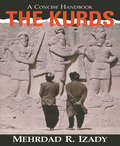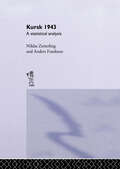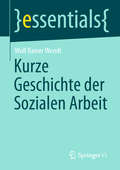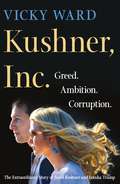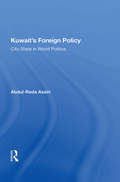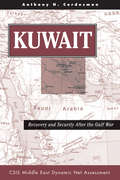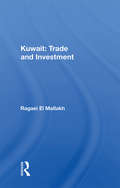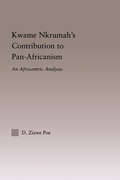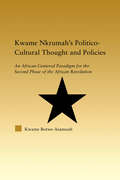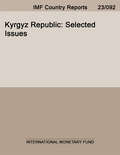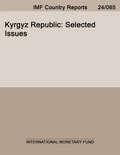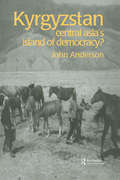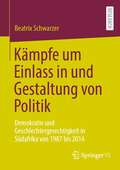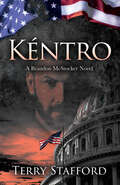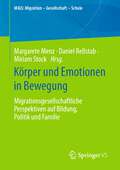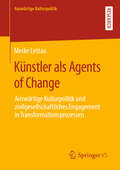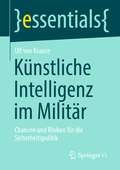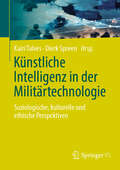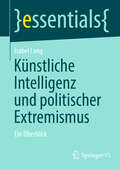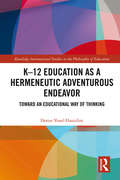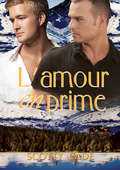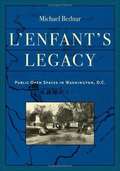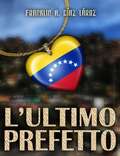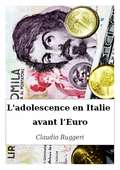- Table View
- List View
Kurds: A Concise Handbook
by Mehrdad IzadyFirst Published in 1993. Routledge is an imprint of Taylor & Francis, an informa company.
Kursk 1943: A Statistical Analysis (Soviet (Russian) Study of War #Vol. 11)
by Niklas Zetterling Anders FranksonThe battle at Kursk in 1943 is often referred to as the greatest tank battle in the history of warfare. This volume makes extensive use of German archival documents as well as various Russian books and articles. As well as an account of the battle, it addresses methodological issues.
Kurze Geschichte der Sozialen Arbeit (essentials)
by Wolf Rainer WendtIn einer verdichteten Darstellung wird die Entwicklung sozialer Betätigung und ihrer Professionalisierung beschrieben – von den Gesellschaften der Aufklärung über soziale Bewegungen und Antworten international auf die soziale Frage in öffentlicher und freier Armenpflege und die Entfaltung von social work hin zu seinen Ausprägungen im Wohlfahrtsstaat unter Bedingungen des sozialen und globalen Wandels.
Kushner, Inc.: Greed. Ambition. Corruption. The Extraordinary Story of Jared Kushner and Ivanka Trump
by Vicky WardThe first explosive book about Javanka and their infamous rise to powerJared Kushner and Ivanka Trump are the self-styled Prince and Princess of America. Their swift, gilded rise to extraordinary power in Donald Trump’s White House is unprecedented and dangerous. <P><P>In Kushner, Inc., investigative journalist Vicky Ward digs beneath the myth the couple has created, depicting themselves as the voices of reason in an otherwise crazy presidency, and reveals that Jared and Ivanka are not just the President’s chief enablers: they, like him, appear disdainful of rules, of laws, and of ethics. <P><P>They are entitled inheritors of the worst kind; their combination of ignorance, arrogance, and an insatiable lust for power has caused havoc all over the world, and may threaten the democracy of the United States. <P><P>Ward follows their trajectory from New Jersey and New York City to the White House, where the couple’s many forays into policy-making and national security have mocked long-standing U.S. policy and protocol. They have pursued an agenda that could increase their wealth while their actions have mostly gone unchecked. <P><P> In Kushner, Inc., Ward holds Jared Kushner and Ivanka Trump accountable: she unveils the couple’s self-serving transactional motivations and how those have propelled them into the highest levels of the US government where no one, the President included, has been able to stop them. <P><b>A New York Times Bestseller</b>
Kuwait's Foreign Policy: City-state In World Politics
by Abdul-Reda AssiriThis book assesses the dynamics of Kuwaiti foreign policy since 1961 and explores the role of Kuwait as a small state in international politics. It analyzes the impact of ideology, religion, and value systems on Kuwaiti foreign policy as well as the impact of domestic forces on political actors.
Kuwait: Recovery And Security After The Gulf War
by Anthony H CordesmanWith the thoroughness that this recently spotlighted nation requires, this volume examines Kuwaits internal and external security situation after the turbulent days of the Gulf War and investigates continued Western involvement in its safekeeping. It also examines Kuwaits changing role as an energy exporter. }With the thoroughness that this recently spotlighted nation requires, this volume examines Kuwaits internal and external security situation after the turbulent days of the Gulf War and investigates continued Western involvement in its safekeeping. It also examines Kuwaits changing role as an energy exporter. }
Kuwait: Trade And Investment
by Ragaei El MallakhAlthough small geographically, Kuwait casts a disproportionately large shadow in the areas of international finance, energy, and trade. It enjoys a capital-surplus economy, but is still a developing country and one of the fastest growing markets for goods and services. Kuwait's drive toward economic development and self-sustaining investment both at home and abroad arises from the knowledge that the nation's prosperity derives overwhelmingly from a single, nonrenewable asset—petroleum. Professor El Mallakh delineates Kuwait's economic activities and potential and assesses the country's impact on the global economy. Basing his work on two decades of research and writing on Kuwait and neighboring Gulf states, and on interviews with Kuwaiti officials and financial and business leaders, he presents a wealth of detailed and practical information, little of which is readily accessible elsewhere. He also analyzes the use of Kuwait's capital-surplus funds with reference to the region, to Europe, and to the United States, and looks at the country's priorities for future international investment and development projects.
Kwame Nkrumah's Contribution to Pan-African Agency: An Afrocentric Analysis (African Studies)
by Daryl Zizwe PoeThis study analyzes contributions made by Kwame Nkrumah (1909-1972) to the development of Pan-African agency from the 1945 Pan-African Congress in Manchester to the military coup d'etat of Nkrumah's government in February 1966.
Kwame Nkrumah's Politico-Cultural Thought and Politics: An African-Centered Paradigm for the Second Phase of the African Revolution (African Studies)
by Kwame Botwe-AsamoahThis study critically synthesizes and analyses the relationship between Kwame Nkrumah's politico-cultural philosophy and policies as an African-centered paradigm for the post-independence African revolution. It also argues for the relevance of his theories and politics in today's Africa.
Kyrgyz Republic: Poverty Reduction Strategy Paper Progress Report
by International Monetary FundA report from the International Monetary Fund.
Kyrgyz Republic: Selected Issues (Imf Staff Country Reports #No. 13/176)
by International Monetary Fund. Middle East and Central Asia Dept.A report from the International Monetary Fund.
Kyrgyz Republic: Selected Issues (Imf Staff Country Reports #No. 13/176)
by International Monetary Fund. Middle East and Central Asia Dept.A report from the International Monetary Fund.
Kyrgyzstan: Central Asia's Island of Democracy? (Postcommunist States and Nations #Vol. 2.)
by John AndersonBorn out of the collapse of the USSR, Kyrgyzstan has been notable for its struggle to develop a pluralist polity and free market, an attempt that distinguishes it from some of its more authoritarian neighbors. This volume introduces students and businessmen to this most attractive of republics, offering an overview of its history, politics, economic development, and place in the international community. In particular, it focuses on the problematic nature of political development, with democratic and pluralist impulses struggling to survive against the dominance of more traditional forms of governance.
Kämpfe um Einlass in und Gestaltung von Politik: Demokratie und Geschlechtergerechtigkeit in Südafrika von 1987 bis 2014
by Beatrix SchwarzerDas Buch nimmt die südafrikanische Transformation vom Apartheitregime zur Demokratie als Rahmen für die Analyse der Verhältnisse von Geschlecht und Politik von 1987 bis 2014. Ausgangsthese ist, dass in Zeiten politischer Transformation sich neue Gelegenheitsfenster für die Realisierung von politischen Zielen und Ansprüchen der gesellschaftlichen Akteur*innen des Wandels öffnen. Diese Öffnungs- und Schließungsmechanismen in den Kämpfen um Geschlechtergerechtigkeit werden auf Subjetkonstruktions- und staatlich-politischer Ebene herausgearbeitet. Eine intersektionale Perspektive ist dabei im südafrikanischen Kontext unerlässlich, weshalb die Verschränkungen von Gender mit anderen Differenzlinien ein zentrales Element der Arbeit ist. Hemmende und fördernde Bedingungen werden im Dialog zwischen sozio-politischen Rahmenbedingungen und inneren Strukturierungen analysiert und damit die langen Linien herausgearbeitet, die den schwierigen Kampf um Antidiskriminierung zeigen.
Kéntro (The Brandon McStocker Novels)
by Terry StaffordThe tragic death of his boss thrusts Brandon into leading the most ambitious project ever undertaken by a country. Even this Harvard MBA and highly sought-after project manager hardly considers himself worthy of supporting the President of the United States on such a monumental endeavor. Forced to overcome his weakness and self-doubt, Brandon must rise to a new calling. Outraged and exhausted by political corruption, the citizens are demanding that the nation’s capital be stripped of the lawless powerbrokers who control it. Brandon puts those closest to him in harm’s way when he shares the president’s unshaken commitment to build a new city across twenty square miles in the middle of nowhere. “Think…Dubai.” He must trust his team completely to avoid the largest project failure in human history. But can he? For those who enjoy the fast-paced excitement, intrigue, and mysterious twists of John Grisham or Tom Clancy novels, will love Kéntro, the first installment in Terry Stafford’s suspenseful Brandon McStocker series.
Körper und Emotionen in Bewegung: Migrationsgesellschaftliche Perspektiven auf Bildung, Politik und Familie (MiGS: Migration - Gesellschaft - Schule)
by Margarete Menz Miriam Stock Daniel RellstabDer Band versammelt aktuelle interdisziplinäre Analysen zu Körper und Emotionen in der Migrationsgesellschaft. Gefühle und Körper spielen eine wesentliche Rolle in Migrationsprozessen wie auch in Diskursen und Debatten über Migration und über ‚Migrationsandere‘. Sie begleiten und verstärken Aushandlungen über Zugehörigkeit, über das Eigene und das Fremde. In den Beiträgen werden Normen und Ideale, Diskriminierungen und Vulnerabilitäten und schließlich auch Widerstandspraktiken im Kontext von Bildung, Politik und Familie vorgestellt und diskutiert.
Künstler als Agents of Change: Auswärtige Kulturpolitik und zivilgesellschaftliches Engagement in Transformationsprozessen (Auswärtige Kulturpolitik)
by Meike LettauKünstler und Kulturaktivisten nehmen als Agents of Change eine zentrale Rolle in gesellschaftspolitischen Transformationsprozessen ein. Die Studie untersucht die Rolle zivilgesellschaftlicher Akteure am Beispiel von Kunstfestivals im öffentlichen Raum im Kontext der Umbrüche in Tunesien in den Jahren 2010/11 und der politischen Transformation von einem diktatorischen zu einem demokratischen System. Darüber hinaus werden neue Aufgaben, Herausforderungen und Chancen auf dem Gebiet deutscher auswärtiger Kulturpolitik am Beispiel der kulturellen Programmarbeit und Kooperationsansätze des Goethe-Instituts betrachtet sowie ein Paradigmenwechsel für das Politikfeld entwickelt.
Künstliche Intelligenz im Militär: Chancen und Risiken für die Sicherheitspolitik (essentials)
by Ulf von KrauseKI-Anwendungen drängen auf breiter Front in das Militär hinein, wodurch sich vielfältige Chancen ergeben (in der Administration, der Krisenfrüherkennung, im militärischen Führungsvorgang, beim Waffeneinsatz, .im „Drohnenkrieg“, in hybriden Konflikten). Die Entwicklung von Letalen Autonomen Waffensystemen bringt geopolitische, ethische und (völker-)rechtliche Risiken, deren Lösung derzeit nicht absehbar ist. Bisher scheuen die Mächte, die KI entwickeln, allerdings als „letzten Schritt“ die Übertragung der Entscheidungsgewalt über das Töten von Menschen an Maschinen. Dieses käme einer Öffnung der „Büchse der Pandora“ gleich.
Künstliche Intelligenz in der Militärtechnologie: Soziologische, kulturelle und ethische Perspektiven
by Dierk Spreen Kairi TalvesIn diesem Buch werden die Herausforderungen im Bereich der aktuellen und zukünftigen Militärtechnologie kritisch und fachübergreifend beleuchtet. Der Band trägt zur Versachlichung der Debatte über den Einsatz von Künstlicher Intelligenz in militärischen Kontexten bei und bietet einen differenzierten, informierten und offenen Zugang zur Thematik. Der Band gliedert sich in drei Teile. Im ersten Teil werden Perspektiven auf KI erörtert; wie KI-Systeme von der Öffentlichkeit, von Soldaten und in kulturellen Diskursen verstanden und konstruiert werden. Der Schwerpunkt liegt dabei auf militärischen Anwendungen. Der zweite Teil befasst sich mit den Herausforderungen und Veränderungen, die der Einsatz von KI im Militär mit sich bringt, und geht der Frage nach, wie damit umzugehen ist. Der dritte Teil untersucht die kommunikativen Herausforderungen, die sich aus dem Einsatz von KI im Militär ergeben, sowie die damit verbundenen Chancen und Risiken. Das hochaktuelle und zeitgemäße Buch richtet sich an Forscher und Studenten aller Fachrichtungen, die sich für Militärtechnologie interessieren, sowie an alle, die sich für KI und neue Technologien interessieren.
Künstliche Intelligenz und politischer Extremismus: Ein Überblick (essentials)
by Isabel LangDieses essential bietet einen Überblick über die Nutzung von KI durch Extremist*innen. Es werden Beispiele für die Nutzung von KI durch Extremist*innen angeführt. Zudem wird diskutiert, wie diese dadurch gezielt etwa Propaganda, Hass und Hetze verbreiten. Ferner werden Chancen und Möglichkeiten für (Sicherheits-)Behörden und andere Institutionen für den Umgang mit der Nutzung von KI durch Extremist*innen sowohl in der Bekämpfung von Extremismus als auch der Prävention thematisiert. Relevant ist der Band somit für Vertreter*innen von (Sicherheits-)Behörden, für Mitarbeitende bei Trägern der Extremismusprävention, für Wissenschaftler*innen, aber auch etwa für die IT-Branche.
K–12 Education as a Hermeneutic Adventurous Endeavor: Toward an Educational Way of Thinking (Routledge International Studies in the Philosophy of Education #17)
by Doron Yosef-HassidimConsidering the role of compulsory mass education and schooling in a democratic society, this book introduces an alternative vision for K-12 education as an "adventurous endeavour." Grounded in a strong theoretical framework, Yosef-Hassidim reveals the negative impact of instrumentalization of schools: when education is considered a social and political instrument, it serves dominant social forces’ interests rather than students’ or humanity as a whole. Offering conceptual and pragmatic frameworks to limit political influence on schooling, the author proposes a new hermeneutical structure that restores education’s agency and separates it from external social forces, and provides the foundation for regarding K-12 education as a sovereign social sphere in its own right.
L' amour en prime (Amour)
by Scotty CadeLa nuit avant son mariage, Zander Walsh, ses parents, et son futur mari se font tirer dessus en interrompant un mystérieux cambriolage alors qu’ils rentrent chez eux. Après trois semaines dans le coma, Zander se réveille pour apprendre qu’il est le seul survivant, et que sa vie parfaite s’est effondrée en un instant.Le bel agent du FBI Jake Elliot enquête sur l’affaire, et il appréhende le tueur – , qui s’échappe rapidement. Après six mois de recherche, Zander et Jake réalisent que le FBI leur fait obstruction… et qu’ils ont lentement tissé un lien indissoluble qui commence à prendre encore davantage d’importance.Une fois qu’ils s’embarquent dans une quête afin d’appréhender le tueur pour la seconde fois, ils découvrent que cette nuit épouvantable était bien plus qu’un simple cambriolage. Les grosses entreprises et les politiciens peuvent-ils cacher la vérité, ou les recherches de Zander et Jake pour découvrir ce qu’il s’est passé marqueront-elles la fin de leur nouvel amour et de leur vie ?
L'Enfant's Legacy: Public Open Spaces in Washington, D.C
by Michael Bednar(front flap) Many American democratic ideals are embodied in the public spaces of its cities, especially in Washington, D.C. In L'Enfant's Legacy architect and scholar Michael Bednar explores the public spaces of the nation's capital, examining the context of the surrounding architecture and the roles of the spaces in the changing functional life of the city. Bednar examines the ways in which L'Enfant's innovative plan of 1791, along with later developments, symbolizes and encourages democratic freedoms and traditions. In the spaces of Capitol Square, citizens expect to encounter their government directly in a dignified setting, a symbolic public forum. On the White House grounds they expect to meet the president where he works and lives. At the National Mall - America's front lawn - citizens exercise their rights of assembly and free speech, as well as play football, eat lunch, and socialize.
L'Ultimo Prefetto
by Franklin A. Díaz LárezIl 31 dicembre del 2001 sono state definitivamente abolite le prefetture del Venezuela. Si trattava di istituzioni regolamentate da una legge anticostituzionale, ingiusta e immorale: la legge dei vagabondi e dei malviventi. I prefetti erano autorizzati a ordinare l’arresto di una persona fino a 72 ore, o a farla rinchiudere a tempo indeterminato in terribili case di reclusione, senza alcun ordine giudiziario previo. Questa legge era stata ereditata dall’ultima dittatura che c’era stata in Venezuela, quella del Generale Marcos Pérez Jiménez, ed era stata quasi del tutto copiata da una simile che c’era in Spagna durante il franchismo. Secondo tale legge, tutti coloro che non avevano un lavoro noto potevano essere considerati vagabondi o malviventi, ed essere sanzionati dai prefetti. Perfino gli omosessuali venivano considerati in questo modo. Per quanto i fondamenti giuridici ed etici di questa legge fossero assurdi, essa era ancora in vigore, e i funzionari incaricati di applicarla non potevano rifiutarsi di farlo. Finché era in vigore, i prefetti erano obbligati ad applicarla e farla rispettare. Purtroppo o per fortuna, il destino ha voluto che fossi uno di quegli ultimi prefetti. Questi sono i racconti di alcuni dei casi più sorprendenti che mi sono trovato ad affrontare.
L'adolescence En Italie Avant L’Euro
by Claudio Ruggeri Marjorie UrsuletDeux amis se rencontrent durant un après-midi d'été, pendant lequel le plus jeune des deux écoute les anecdotes et les récits de l'autre, à propos d'un monde récemment disparu, qui ne pourra plus exister, ce monde où il n'était pas rare d'entendre la phrase "Non ho una Lira*..."* Bien que la monnaie d'échange en Italie soit actuellement l'Euro, cette expression est encore utilisée, alors que l'authenticité des expressions équivalentes françaises comme "Je n'ai plus un rond" ou encore "Je n'ai plus un radis", n'a en aucun cas été affectée par le passage du Franc à l'Euro.
